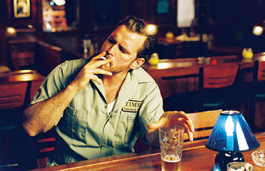home | metro silicon valley index | movies | current reviews | film review

Barfly: Matt Dillon plays Charles Bukowski's iconic drunk, Henry Chinaski, in 'Factotum.'
The Nausea Also Rises
'Factotum' faithfully renders the life of Henry Chinaski, the rebel with a drink of Charles Bukowski's novel
By Richard von Busack
SO THAT'S the question, isn't it? Is cinema meant to exalt humanity at its best or faithfully to record our species at its worst? Factotum has it both ways. The protagonist is a shambling wino, but he is also heroic, a man among men, a rebel—in short, a figment of Charles Bukowski's self-imagination.
One scene unfolds as a long, frozen-camera shot of Matt Dillon's Henry Chinaski getting up late in the morning. Chinaski stirs and rises. The slow realization of nausea dawns on him, as if his stomach had sent the news of its rebellion via fourth-class mail. Waddling to the toilet, he is noisily sick.
On the crumpled bed, Jan (Lili Taylor), his girlfriend of the moment, awakes, has the same realization and follows his path. Wiping off his mouth, under who knows what kind of pain, Chinaski gets himself a cold beer and forces it down. That's grace under pressure, Bukowski style: standing up to the worst the bottle can do.
Norwegian director Bent Hamer (Kitchen Stories) based Factotum on Bukowski's 1975 novel. The obscure title means a man who does many jobs, just as the old soak did: placing brake drums into cardboard boxes, driving an ice truck and dusting a colossal statue. (It's Carl Milles' Vision of Peace in the St. Paul, Minn., City Hall.) These menial tasks are all the more menial for a man whose vocation is getting laid, getting drunk and committing the occasional story to paper.
As in all Bukowski lore, the hazards of ordinary life are worsened by women. They are all glamorous creatures with 150,000 miles on them. Marisa Tomei plays Laura, a kept woman who eventually falls out of Chinaski's life. Jan is the one who keeps turning up again and again, a sweet-natured stray who gets lost for good. In this superb part, Taylor is as eager as a puppy, flaunting her bruised, veal-colored body as she tries to cook her man some postcoital pancakes. But while they seem like the perfect couple, Jan has an insistent streak that will worsen as she deals with this stubborn, passive man.
Dillon's approach to Bukowski's alter ego differs from Mickey Rourke's star turn in 1987's Barfly. Rourke plays Chinaski as a drunk pixie in a state of grace. Dillon—as always, funniest when he is being most grave—looks more like the true Bukowski than Rourke.
His face made up with a flush of burst-capillary red, Dillon looks as if he had a low-level case of poison ivy. Like Rourke, Dillon has the same shuffle, more pronounced after Chinaski almost burns off his own genitalia with crab medicine. But Dillon's Chinaski doesn't get happy, like Rourke's Chinaski does; you can't imagine him toasting his fellow barflies, "To my friends!"
Dillon brings out Bukowski's groggy Germanic side. Chinaski is a slow bear, and the comedy comes in his stolid reaction to dealing with squares and bosses and, worst of all, writers. That's Chinaski's curse: He wants the world to know he's a writer, but he can't bear to talk about literature.
While Factotum is precise in the language and the acting, the sense of era seems uncertain. The petty bosses wear toupees and loud suits and smoke cigars, and we see 1950s advertising art on the wall. But computer terminals also sit on the desks. Bukowski writes about an era before "bums" became known as "the homeless"; it's hard to see how a calm tavernaut like Chinaski fits in with the more worn and humbled extras at the day-laborer hall.
And Chinaski seems out of his element, since Hamer filmed in Minneapolis. Despite such evidence as Tom Waits' song "Ninth and Hennepin," it's hard to visualize the Twin Cities as a place where a man could hit bottom. Hamer shot in summer, which gives the impression of a gentle midnight sun, not L.A.'s blaring, klieg-light heat.
Except for the tavern where Chinaski picks up Laura, none of the bars looks quite as raspy as it should. One has wide picture windows and beer in pint glasses, and a tell-tale sign that reads "University Avenue" outside the window. A college bar! When Chinaski wanders out to the racetrack, it's in green forested country. Helmeted bicyclists pass him by. It's all so dismayingly healthy out there.
Hamer found one fine location: a tall brick building with one lonely window hacked out of it, from which Chinaski can look out at downtown. The sight of this drunken Rapunzel is a perfect emblem of the crap jobs Chinaski drifts into, from one to the other.
No matter how often Bukowski claimed that he hated movies, clipped, wisecrack-ridden screenplay- style dialogue soaked into his prose—a hazard of living in L.A. In translation he may sound like Celine—or, vide this Norsified adaptation, Knut Hamsun—but in English he sounds like the stuff of movies.
Of a rather good one, in this case. Dillon, Tomei and Taylor are all a dirty pleasure, and this appealingly sordid vision of a life of self-indulgence doesn't equal a self-indulgent picture.
![]() Factotum (R; 94 min.), directed by Bent Hamer, written by Hamer and Jim Stark, based on the novel by Charles Bukowski, photographed by John Christian Rosenlund and starring Matt Dillon, Marisa Tomei and Lili Taylor, opens Aug. 25.
Factotum (R; 94 min.), directed by Bent Hamer, written by Hamer and Jim Stark, based on the novel by Charles Bukowski, photographed by John Christian Rosenlund and starring Matt Dillon, Marisa Tomei and Lili Taylor, opens Aug. 25.
Send a letter to the editor about this story.
|
|
|
|
|
|